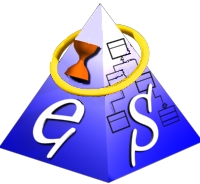Studentische Arbeiten
P2P Management of Social Knowledge Networks
Typ der Arbeit:
Betriebspraktikum,
Master-Thesis,
Diplomarbeit
Bearbeitungsstand: Abgeschlossene Arbeiten
Möglicher Beginn der Arbeit: As soon as possible
Arbeit abgeschlossen am: 12.12.2011
Betreuer*in: Dr.-Ing. Karsten Saller
Motivation
Peer-to-peer systems are evolving as a viable distributed resource sharing paradigm on the Internet. The trend is growing towards the usage of such decentralized systems because they are more scalable and resource efficient than centralized systems. Current decentralized systems, like peer-to-peer networks, lack functionality to adapt the transmission of certain information artifacts, according to their access patterns. Additionally, there is still no approach for an efficient dependency management between distributed and dependent information in decentralized networks. Such functionality is of major importance within collaborative applications like a wiki or a social network, where information may be associated to specific users or content.

Aufgabenstellung
We at the research group QuaP2P (TU Darmstadt, RWTH Aachen and University of Mannheim) already started developing such decentralized collaborative applications (e.g. Piki, Life Social). However, there are still some interesting research questions open, like the decentralized management of dependent data:
How can data be collected and propagated effectively?
Can a centralized dependency management be replaced by a decentralized one?
Preliminary results of our research are encouraging and may lead to new possibilities for a self-optimization within decentralized systems. That means in future we do not longer need a server farms managing our private data in social, knowledge or collaborative networks, as everything could seamlessly be managed on decentralized, p2p fashion, with no censorship or private data protection issues.
Specific goals of this thesis:
Familiarize with P2P-based data dissemination strategies
P2P data management: Implementing new methodologies to diesseminate data
Self-optimization: Looking into new possibilities for self-optimization
Evaluation: Using simulative methods to evaluate different P2P management approaches
Voraussetzungen
Motivation to investigate latest trends in network research
Previous P2P knowledge recommended but not necessary
Good programming skills in Java and drive to take it to the next level



